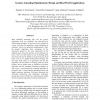Free Online Productivity Tools
i2Speak
i2Symbol
i2OCR
iTex2Img
iWeb2Print
iWeb2Shot
i2Type
iPdf2Split
iPdf2Merge
i2Bopomofo
i2Arabic
i2Style
i2Image
i2PDF
iLatex2Rtf
Sci2ools
118
click to vote
ISDA
2008
IEEE
2008
IEEE
Genetic Annealing Optimization: Design and Real World Applications
Both simulated annealing (SA) and the genetic algorithms (GA) are stochastic and derivative-free optimization technique. SA operates on one solution at a time, while the GA maintains a large population of solutions, which are optimized simultaneously. Thus, the genetic algorithm takes advantage of the experience gained in the past exploration of the solution space. Since SA operates on one solution at a time, it has very little history to use in learning from past trials. SA has the ability to escape from any local point; even it is a global optimization technique. On the other hand, there is no guarantee that the GA algorithm will succeeded in escaping from any local minima, thus it makes sense to hybridize the genetic algorithm and the simulated annealing technique. In this paper, a novel genetically annealed algorithm is proposed and is tested against multidimensional and highly nonlinear problems: Fed-batch fermentor for Penicillin production, and isothermal continuous stirred tan...
Related Content
| Added | 31 May 2010 |
| Updated | 31 May 2010 |
| Type | Conference |
| Year | 2008 |
| Where | ISDA |
| Authors | Mostafa A. El-Hosseini, Aboul Ella Hassanien, Ajith Abraham, Hameed Al-Qaheri |
Comments (0)

